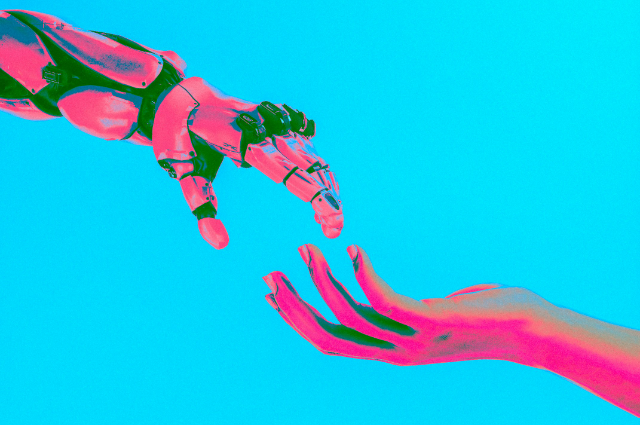
Photo by Cash Macanaya on Unsplash
Artificial intelligence is a branch of computer science dedicated to creating computers and programs that can replicate human thinking. Some AI programs can learn from their past by analysing complex sets of data and improve their function without the help of humans to refine their programming.
As AIs have boomed in recent years, it’s become commonplace in both business and everyday life. People use AI every day to make their lives easier, interacting with AI-powered virtual assistants or programs. Companies use AI to streamline their production processes, project gains and losses, and predict when maintenance will have to occur.
Artificial intelligence emerged and is playing a pivotal role in human life. Exerting a profound influence on diverse facets of human existence. We’re very involved in AI as part of our day. The pervasive influence of AI extends across a multitude of fields, including education, healthcare, entertainment, and more, in everyday activities. Upon in-depth examination, it shows the extensive impact of AI on human existence. It features key points in daily life, such as
- 24*7 availability
- Healthcare
- Education
- Entertainment
- Business and economy
- Daily life
24*7 Availability
AI programs are available at all times, whereas humans work 8 hours a day. Machines can work all through the day and night, and AI-powered chatbots can provide customer service even during off-hours. In recent days, humans are asking personal doubts to chatbots that actively respond and help to avoid certain health risks.
Healthcare
It has been playing a transformative role in the healthcare sector through the enhancements in diagnostic precision, treatment customisation, and the wide advancement of performing complicated surgeries. The utilisation of machine learning algorithms enables the examination of medical information for the anticipation of disease epidemics, recognition of patient susceptibility factors, and facilitation of early disease detection. AI-driven instruments such as image interpretation systems and automated surgical platforms amplify the accuracy and effectiveness of medical interventions, consequently resulting in improved patient prognoses.
Education
It expands the platform of customized learning experiences through adjustment to the unique requirements of each student. Tailored feedback and resources are delivered by intelligent tutoring systems, with the assistance of AI-driven analytics aiding educators in pinpointing areas of learning deficiency and enhancing pedagogical approaches. Interactive and easily accessible learning environments are provided by virtual classrooms and AI chatbots, thereby enhancing the inclusivity and efficacy of education.
Entertainment
In the entertainment realm, it has been significantly influenced by enhanced content creation and recommendation systems. Streaming services use AI algorithms to suggest personalised content based on user preferences, ensuring a more engaging viewing experience. AI-generated music gives a reprised version of some irreplaceable nostalgic melodies. Which offers a new form of artistic expression and innovation.
Business and Economy
It elevates the quality of the decision-making process through the extraction of valuable insights derived from the analysis of large-scale data. Customer service solutions propelled by AI, like chatbots, virtual agents, elevate the quality of customer interactions and enhance operational efficiency. The utilisation of predictive analytics and machine learning algorithms enables enterprises to enhance the efficiency of supply chain management, predict consumer demand, and mitigate expenses. Thereby fostering economic progress and fostering innovation.
Daily life in AI
AI has been powered with virtual assistants, Siri, Alexa, and Google Assistant have become a Part of life. Starting from the alarm, checking the weather, a quick recipe, a getaway suggestion, to getting the directions. This makes it possible to access the information easily. It also aims for safety and reduces congestion, leading to more efficient, sustainable urban living.
Despite many advantages, the integration of AI also raises ethical and social concerns like data privacy, algorithmic bias, and job displacement due to its automation, which must involve careful consideration and regulation. Ensuring that AI is developed and deployed responsibly is crucial to mitigate these challenges and maximise its positive impact on society. The influence of artificial intelligence on human existence is extensive and profound. With the ongoing progression of AI technology, the capacity to improve different facets of human life becomes more evident. By accepting AI’s capabilities alongside the consideration of its ethical consequences, we can leverage its potential to establish a future that is more effective and inventive.
Disadvantages?
Lack of emotion and creativity
AI lacks the human ability to use emotion and creativity in decisions. The lack of creativity means AI can’t create new solutions to problems or excel in any overly artistic field. It can be programmed to create novel ideas but not original ones. It can overtake humans' abilities to be creative, which means it will be hindered in its decision-making. If a company is looking for a new or creative solution to a problem, humans are better capable of providing that solution.
When making sensitive decisions, humans inherently consider the emotional ramifications. AI doesn’t have the responsibility; it can only make the most optimal decision based on the parameters with which it has been provided, regardless of the emotional impact. Even the AI has been programmed to read and understand human emotions falls short.
Compassion and kindness are both inherently human traits, but cannot be programmed into even the best AI.
Reducing jobs
This is yet another disadvantage many people know immediately, thanks to many headlines over the years. As AI becomes more commonplace at companies, it may decrease available jobs, since AI can easily handle repetitive tasks that were previously done by workers.
Now, many reports show that AI will likely create just as many new jobs as it makes obsolete. If not more, but when you run into the problem of having to train humans on these new jobs, or leaving workers behind with the surge in technology.
. . .
References:
- Skyline University.acc.in
- aiic.org
